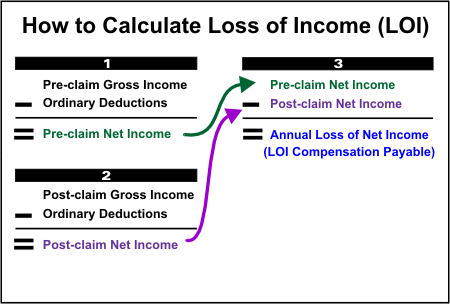Loss of Income
LOI Fundamentals
In this section:
LOI Calculation - An Illustration
(top)
The following table illustrates
how Annual Loss of Net Income is calculated:

| Pre-Claim Gross Income |
In all cases,
Pre-claim Gross Income is an amount equal
to the average of the three highest consecutive years
of Earned
Income prior to your year of disability. The
Pre-claim Gross Income will not exceed $300,000 multiplied
by the ratio that the Pension Index for the year bears
to the Pension Index for 1999;
UNLESS
You were a student
at the time of infection, in
which case your pre-claim gross income may
be calculated as follows: Pre-claim Gross Income
is an amount equal to the then most recently available
Average
Industrial Wage in Canada if you meet the following
criteria:
- You were
not working prior to your infection with HCV
AND you were infected either before
you attained 18 years of age; OR
- You attained 18 years
of age, while you were in full-time attendance
at an accredited education institution in Canada AND
did not yet enter the workforce on a permanent
and full-time basis.
|
| Ordinary Deductions |
Ordinary Deductions
means income taxes, Unemployment/ Employment Insurance,
and Canada Pension Plan/Quebec Pension Plan deductions
applicable in the province or territory where you are/were
resident.
|
| Post-claim Gross Income |
Post-claim Gross
Income is the total
of:
- Earned Income
- Canada Pension Plan/Quebec
Pension Plan benefits on account of illness or disability
- Unemployment Insurance/Employment
Insurance benefits
- Income replacement benefits
under a sickness, accident or disability insurance
plan
- EAP benefits
- MPTAP benefits
- Nova Scotia Compensation
Plan benefits
|
Earned
Income means taxable income
for the purposes of the Income Tax Act from an office or employment
or from carrying on an active business.
| Earned
Income can include: |
Types
of income that CANNOT be claimed as Earned Income |
- Employment income
- Commission income
- Income from self-employment
(i.e. business, professional, farming, fishing)
- Rental income
|
- Interest/Dividends/Capital
gains/RRSP income
- Pension/Superannuation/Old
Age Security
- Retiring allowance/Severance
Pay
- Rental income ( if considered passive investment income)
- Scholarship
- Unemployment/Employment
Insurance benefits
- Canada Pension Plan benefits
- Social Assistance benefits
- Workers Compensation benefits
|
Financial Documents That You
Must Submit (top)
- a complete T1 Income Tax return
and notice of assessment
- business financial statements
- T2 Corporation Income Tax return
and notice of assessment
- T4/T4A slips
- T1 Income Tax summary
The following is an illustration
of how Net Income is calculated:
Deductions and Tax
Credits
For the purposes of all income tax calculations,
the only Deductions
and Tax Credits that will be used if applicable are the following:
- alimony and maintenance payments
deduction
- basic personal tax credit
- married person’s or equivalent
to married tax credit
- disability tax credit
- unemployment/employment insurance
premium tax credit
- Canada Pension Plan/Quebec Pension
Plan contribution tax credit
IMPORTANT
NOTE! (top)
Information herein is based on
Section
4.02(2) (Sch. A - Transfused HCV Plan), or Section
4.02(2) (Sch. B - Hemophiliac HCV Plan) of the 1986-1990
Hepatitis C Settlement Agreement, and is provided solely
to assist you in determining whether or not you should
submit a claim for loss of income.
(Top)
|
